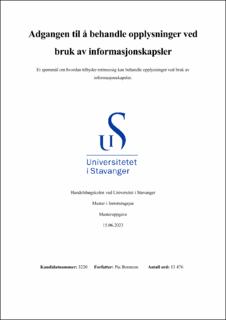| dc.description.abstract | Etter dagens rettskildebilde er det etablert en streng linje for hvordan en tilbyder lovlig kan behandle opplysninger om juridiske og fysiske personer ved bruk av informasjonskapsler. Dette har bakgrunn i kravene knyttet til den tekniske, innholdsmessige og visuelle utformingen av en informasjonskapsel. I norsk rett er den unntaksvise adgang til å behandle opplysninger ved bruk av informasjonskapsler regulert i lov om elektronisk kommunikasjon (ekomloven) § 2-7b. Bestemmelsen bygger på cookie-bestemmelsen nedfelt i ePrivacy-direktivet Artikkel 5 (3). Etter gjeldende rett er eneste legitime behandlingsgrunnlag for å behandle opplysninger ved bruk av informasjonskapsler å hente inn et frivillig og informert samtykke. Imidlertid, på bakgrunn av stadig nye teknologiske utviklinger, tilveksten av nye tilbydere og nye markedsføringsmodeller er ikke lenger dagens regelverk tilstrekkelig for å ivareta personvernet til den enkelte bruker. På bakgrunn av dette er det både etter nasjonal og internasjonal rett satt igang en moderniseringsprosess. Adgangen til å behandle opplysninger ved bruk av informasjonskapsler er fremmet i ny ekomlov § 3-7 som bygger på direktiv 2002/58/EC Artikkel 5 (2). Samtidig er det i EU fremmet forslag til ny kommunikasjonsvernforordning som i tillegg til samtykke vil åpne for andre, alternative, behandlingsgrunnlag. | |
| dc.description.abstract | According to the current legal source picture, a strict line has been established for how a provider can legally process information about legal and natural persons using cookies. This has a background in the requirements relating to the technical, content and visual design of a cookie. In Norwegian law, the exceptional right to process information through the use of cookies is regulated in the Electronic Communications Act (ekomloven) § 2-7b. The provision is based on the cookie provision laid down in the ePrivacy Directive Article 5 (3). According to current law, the only legitimate processing basis for processing information using cookies is to obtain a voluntary and informed consent. However, against the background of constantly new technological developments, the growth of new providers and new marketing models, the current regulations are no longer sufficient to safeguard the privacy of the individual user. Based on this, a modernization process has been initiated both according to national and international law. The right to process information through the use of cookies is advanced in the new ekomlov § 3-7 which is based on directive 2002/58/EC Article 5 (2). At the same time, proposals have been put forward in the EU for a new Regulation on Privacy and Electronic Communication which, in addition to consent, will open up other, alternative, grounds for processing. | |
